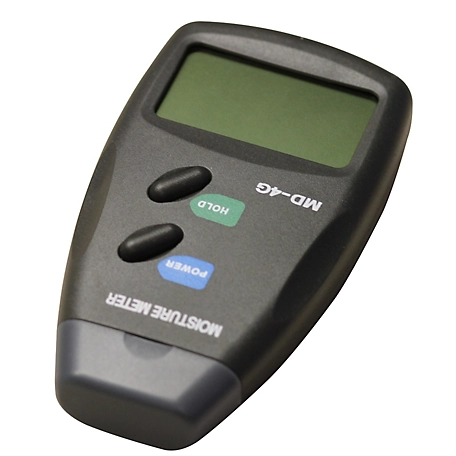Moisture Meter Reviews: Comparing the Best Versions for Expert and DIY Use
Moisture Meter Reviews: Comparing the Best Versions for Expert and DIY Use
Blog Article
The Ultimate Overview to Moisture Meters: A Comprehensive Introduction and Just How They Can Conserve You Money
In the realm of building upkeep, building and construction, and different industries, the relevance of accurately gauging dampness degrees can not be overemphasized. Dampness meters act as crucial devices in finding and keeping track of moisture material in materials, helping in stopping costly damages and making sure the high quality of products. Understanding the nuances of different kinds of dampness meters, their applications, and the prospective cost-saving benefits they supply can be a game-changer for experts and organizations alike. Finding just how these devices can not just enhance processes but likewise contribute to economic savings is a trip worth beginning on.
Kinds of Moisture Meters
One typical type is the pin-type moisture meter, which determines the electrical resistance in between two pins placed into a product. Pinless wetness meters, on the various other hand, use electro-magnetic sensing unit plates to check a larger location without creating damage to the product's surface area.
Additionally, there are additionally specialty moisture meters developed for details materials like hay, soil, or grain. These meters offer precise moisture readings tailored to the one-of-a-kind properties of the product being tested. Infrared wetness meters gauge the thermal residential properties of a product to establish its wetness content non-invasively, making them useful for applications where pin or pinless meters might not be ideal. Understanding the various kinds of moisture meters offered can assist markets pick one of the most ideal tool for their particular moisture measurement requirements.

Benefits of Utilizing Moisture Meters

Moreover, using moisture meters can lead to increased energy performance. In farming settings, dampness meters play a critical function in enhancing crop returns by enabling farmers to keep an eye on dirt moisture degrees and make notified watering choices.
How to Choose the Right Moisture Meter
Selecting the suitable moisture meter includes thinking about key factors such as product compatibility, dimension array, and calibration precision. When selecting a dampness meter, it's necessary to guarantee that the meter appropriates for the specific material you will be screening. Various materials have differing electrical buildings that can influence moisture analyses, so choosing a meter created for your material is vital for precise outcomes. Furthermore, take into consideration the measurement variety of the wetness meter. Ensure that the meter can identify moisture levels within the range needed for your applications. Calibration precision is one more important aspect to keep in mind (Moisture Meter). Choose for a dampness meter with reputable calibration to make certain accurate and constant readings. Some meters might need routine calibration changes, so recognizing the calibration process is vital. By meticulously assessing these factors, you can choose a dampness meter that satisfies your needs and supplies exact moisture dimensions for your jobs.
Appropriate Techniques for Moisture Meter Use
To ensure precise moisture readings and optimize the effectiveness of a moisture meter, utilizing correct basics techniques is important. When utilizing a pin-type moisture meter, insert the pins or probes into the material being examined until they make complete call. By adhering to these correct techniques, customers can rely on their moisture meter to offer trustworthy wetness levels, aiding in preventing pricey damages or ensuring high quality in various applications.

Price Financial Savings With Moisture Meter Applications
How can the critical application of moisture meters lead to substantial expense savings throughout numerous industries? In the farming sector, dampness meters help in establishing the optimum time for harvesting plants, preventing over-drying or excess wetness that can impact the last item's quality.

Additionally, in the food processing sector, dampness meters are important for monitoring product top quality and ensuring conformity with safety and security policies. By properly gauging wetness content in food products, suppliers can avoid perishing, maintain freshness, and minimize waste, leading to considerable expense financial savings. On the whole, the tactical application of moisture meters is a valuable investment that can bring about considerable cost reductions and boosted performance throughout numerous sectors.
Verdict
In conclusion, wetness meters are important devices for gauging and discovering dampness degrees in various materials. By utilizing the ideal dampness meter and following proper strategies, users can successfully protect against expensive damages triggered by excess wetness.
Dampness meters serve as vital devices in spotting and monitoring moisture material in materials, helping in preventing expensive problems and ensuring the quality of products. Infrared wetness meters determine the thermal properties of a material to identify its dampness material non-invasively, making them beneficial for applications where pin or pinless meters may not be ideal.Moisture meters provide important advantages in properly checking and analyzing dampness degrees in diverse materials and atmospheres. In agricultural setups, dampness Go Here meters play an important role in optimizing crop yields by making it possible for farmers to monitor dirt moisture degrees and make notified watering choices.In final thought, moisture meters are important devices for spotting and gauging moisture levels in various products.
Report this page